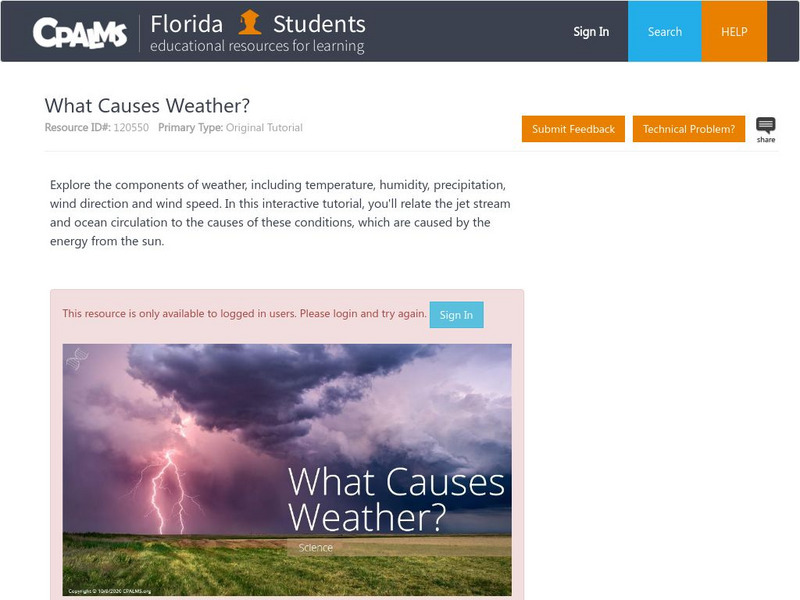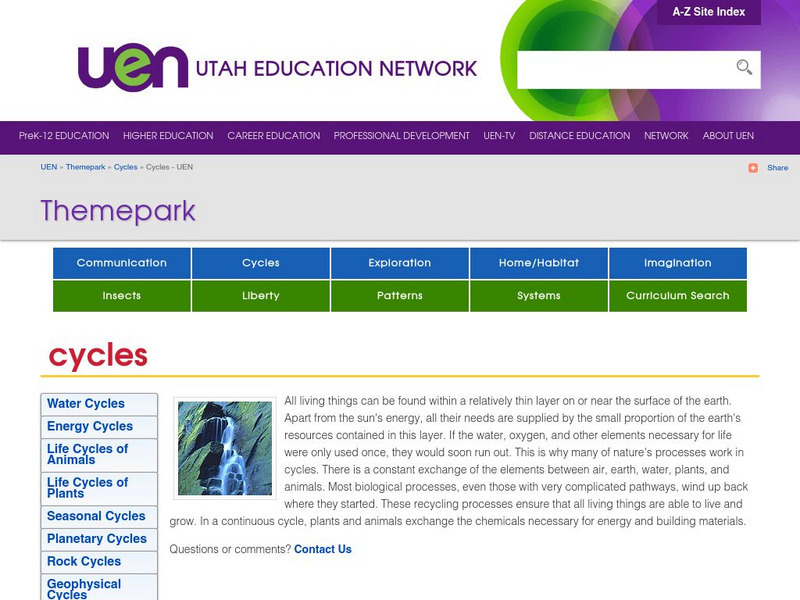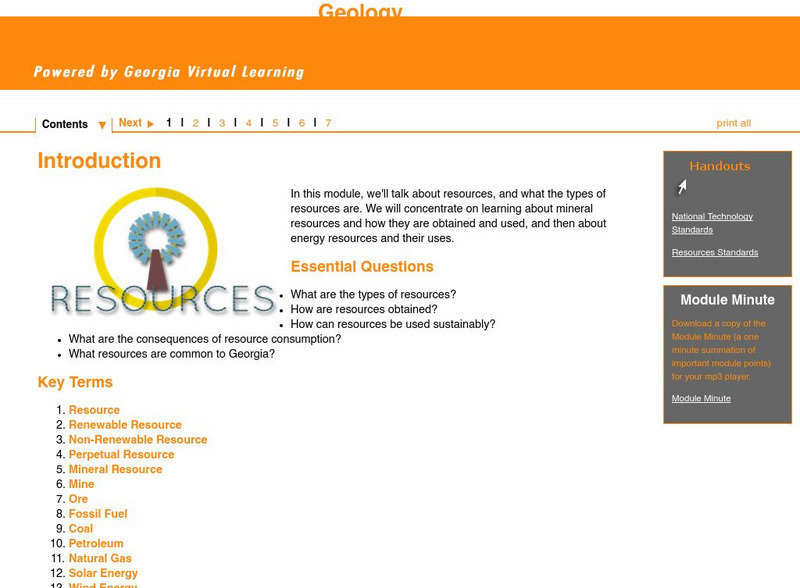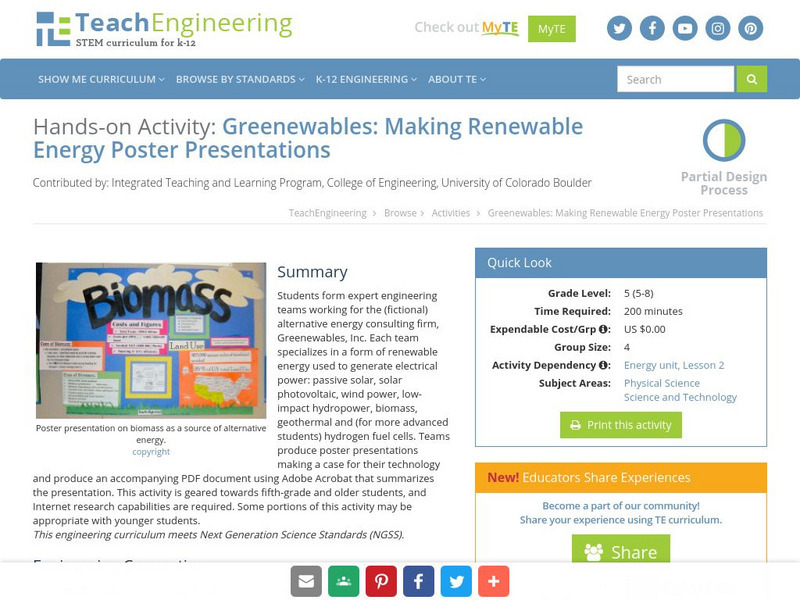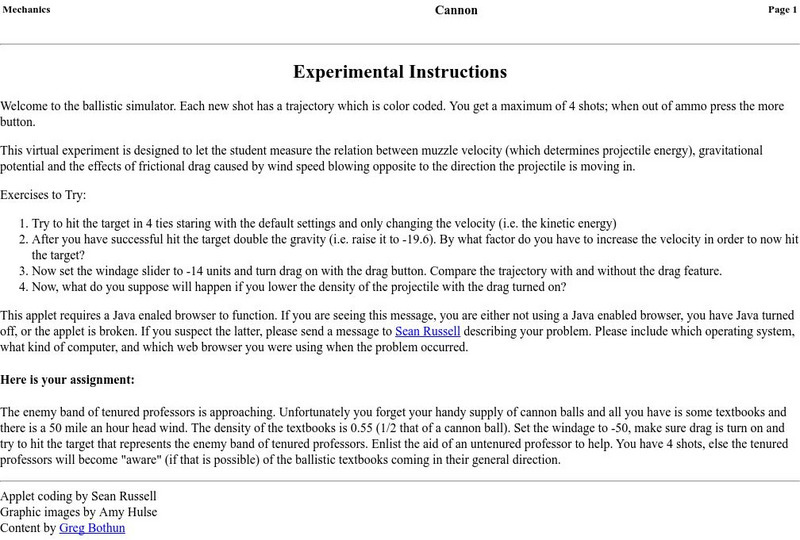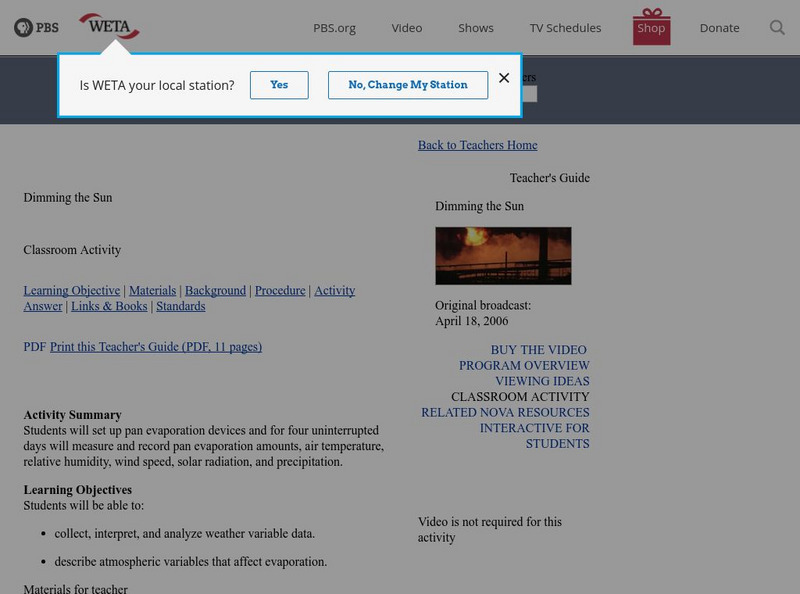Other
Renewable Resource Data Center (R Re Dc)
This site provides information on renewable energy, including biomass resources, geothermal resources, solar resources, and wind resources.
Michigan Department of Education
Central Michigan University: 3 D Science Performance Assessment Tasks
In this well-developed lesson plan, students will develop a model of a wind turbine and present their models to the group. The students will further construct an explanation of the design to support that energy is transferred and...
CPALMS
Florida State University Cpalms: Florida Students: What Causes Weather?
Determine parameters of weather; including specifically temperature, humidity, precipitation, wind direction and wind speed in this tutorial. During this tutorial, you will relate the jet stream and ocean circulation to the causes of...
Other
Digital Library for Earth System Education: Teaching Box: Seasonal Upwelling
A suite of lessons focusing on the process of upwelling. Inquiry-based exploration of seasonal upwelling includes marine food webs, food production in the ocean, wind-driven ocean currents, and seasonal changes in biotic and abiotic...
Utah Education Network
Uen: Themepark: Cycles
This is a large collection of resources on cycles of nature and the Earth. There is a constant exchange of the elements between air, earth, water, plants, and animals. Most biological processes wind up back where they started. These...
TeachEngineering
Teach Engineering: Environment
Through 10 lessons and more than 20 hands-on activities, students are introduced to the concept of an environment and the many interactions within it. As they learn about natural and human-made environments, as well as renewable and...
Georgia Department of Education
Ga Virtual Learning: Geology Resources
In this interactive tutorial you will learn about geological resources. Learn what the types of resources are and concentrate on learning about mineral resources and how they are obtained and used, and then about energy resources and...
Woods Hole Oceanographic Institution
Woods Hole Oceanography Institute: Deep Ocean Circulation
What causes the circulation of ocean waters that are too deep to be affected by wind? Find out how salinity and temperature drive the deep sea currents. This resource has several videos and an online quiz.
EL Education
El Education: Renewing Our Future
After completing research and field-work, students create a calendar with photographs, illustrations, and information about four different types of renewable energy: solar, wind, hydropower, and biomass.
CK-12 Foundation
Ck 12: Life Science: 12.29 Renewable Resources
Learn how some renewable resources contribute to alternative energy sources.
Curated OER
Science Kids: Science Images: Wind Power
This photo shows a huge wind turbine used to harness wind power for energy. The massive structure dwarfs the person visible in the photo and stands against a beautifully blue sky background.
PBS
Pbs Learning Media: Weather: What Is Weather?: Lesson Plan
Learn how weather is the combination of four factors -- temperature, wind, precipitation, and sunlight and clouds -- that occur at a given place and time in this lesson plan from WGBH. The mix of factors is changing all the time;...
TeachEngineering
Teach Engineering: Greenewables
Students form expert engineering teams working for the (fictional) alternative energy consulting firm, Greenewables, Inc. Each team specializes in a form of renewable energy used to generate electrical power: passive solar, solar...
Ministry of Education, Sports & Culture (Samoa) Government
Mesc: Samoa School Net: Forces to Make Weather: Weather & Water Cycle
Explains three forces of nature and how they impact the weather. These include infrared rays from the sun, differences in air pressure, and wind flow when hot and cold air masses meet. Supported by lots of visuals.
Other
Kidstorm: Hurricanes
Get the facts on hurricanes with this detailed information page. This page includes photos, charts and satellite images.
PBS
Pbs Learning Media: Severe Weather
Observe various severe weather phenomena in this image gallery from WGBH. Weather is the combination of factors -- temperature, wind, snow or rain, and sunlight and clouds -- that happen in a specific place at a specific time. Sometimes...
NASA
Nasa: Space Place: What Is Space Weather?
Learn all about space weather and solar wind. Comared to the energy of these storms, Hurricane Katrina was no comparison.
CK-12 Foundation
Ck 12: Earth Science: Effect of Atmospheric Circulation on Climate
[Free Registration/Login may be required to access all resource tools.] Looks at how atmospheric circulation cells affect the climate of regions.
University of Oregon
University of Oregon: Global Climate Animations
Check out this site for global climate animations. "Get a feel for why we have seasonal weather changes or why other regions have different weather than you do."
University of Oregon
Uo: Cannon Simulator: Experimental Instructions
This virtual experiment is designed to let the student measure the relation between muzzle velocity (which determines projectile energy), gravitational potential and the effects of frictional drag caused by wind speed blowing opposite to...
PBS
Pbs Teachers:dimming the Sun
Conduct an experiment and investigate how air temperature, relative humidity, wind speed, solar radiation and precipitation affect evaporation. Graph the data collected during the experiment.

